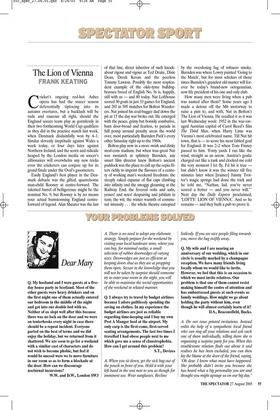The Lion of Vienna
FRANK KEATING
Cricket’s ongoing red-hot Ashes opera has had the soccer season deferentially tiptoeing into its autumn overtures, but a backlash will be rude and raucous all right, should the England soccer team play as gormlessly in their two forthcoming World Cup qualifiers as they did in the practice match last week, when Denmark disdainfully won by 4–1. Similar slovenly ineptitude against Wales a week today, or four days later against Northern Ireland, and the scorn and ridicule heaped by the London media on soccer’s zillionaires will overwhelm any new tricks even the cricketers can conjure up for its grand finale under the Oval’s gasometers.
Easily England’s best player in the Denmark debacle was the gifted, quarrelsome man-child Rooney at centre-forward. The talented barrel of belligerence might be the nominal No. 9, but Rooney is by no means your actual barnstorming England centreforward of legend. Alan Shearer was the last of that line, direct inheritor of such knockabout rigour and vigour as Ted Drake, Dixie Dean, Derek Kevan and the peerless Tommy Lawton. Possibly the most resplendent example of the olde-tyme bulldogbravura breed of English No. 9s is, happily, still with us — and 80 today. Nat Lofthouse scored 30 goals in just 33 games for England, and 285 in 505 matches for Bolton Wanderers. Nat joined his coal-bagger dad down the pit at 15 the day war broke out. He emerged with the peace, grimy but bonnily combative, barn door-broad and fearless, to parade in full pomp around penalty areas the world over, most particularly Burnden Park’s every other Saturday right up to the 1960s.
Bolton play now in a more swish and dinky mod-cons stadium, but when true-great Nat was monarch at splintery Burnden, any smart film director knew Bolton’s ancient paddock was the place to call up the sepia filters richly to imprint the flavours of a century of working man’s weekend freedoms: the steeply raked expanse of flat caps climbing into infinity and the smoggy gloaming at the Railway End; the fevered oohs and aahs, yesses! and noes! despairing and jubilant in turn; the wit; the winter warmth of communal intensity ... the whole theatre canopied by the overdosing fug of tobacco smoke. Burnden was where Lowry painted ‘Going to the Match’, but for most scholars of those times Burnden’s grandest old master will forever be today’s brand-new octogenarian, now life president of his one and only club.
How many men were living when a pub was named after them? Some years ago I made a detour off the M6 motorway to raise a pint to, and with, Nat in Bolton’s The Lion of Vienna. He recalled it as it was last Wednesday week: 1952 in the war-ravaged Austrian capital of Carol Reed’s film The Third Man, when Harry Lime was Vienna’s most celebrated name. Till Nat hit town, that is — to score his most fabled goal for England. It was 2–2 when Tom Finney passed to him. ‘Forty yards I ran like the wind, straight as an arrow. Austria’s goalie charged out like a tank and clocked me cold the very moment I let fly. I’d hit it true but didn’t know it was the winner till five minutes later when [trainer] Jimmy Trotter’s magic sponge had done the trick and he told me, “Nathan, lad, you’ve never scored a better — and you never will.”’ Next day the Daily Express proclaimed, ‘LOFTY: LION OF VIENNA’. And so he remains — and they built a pub to prove it.











































 Previous page
Previous page